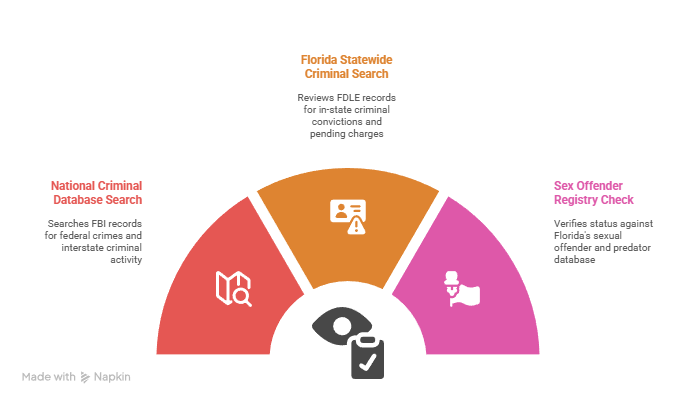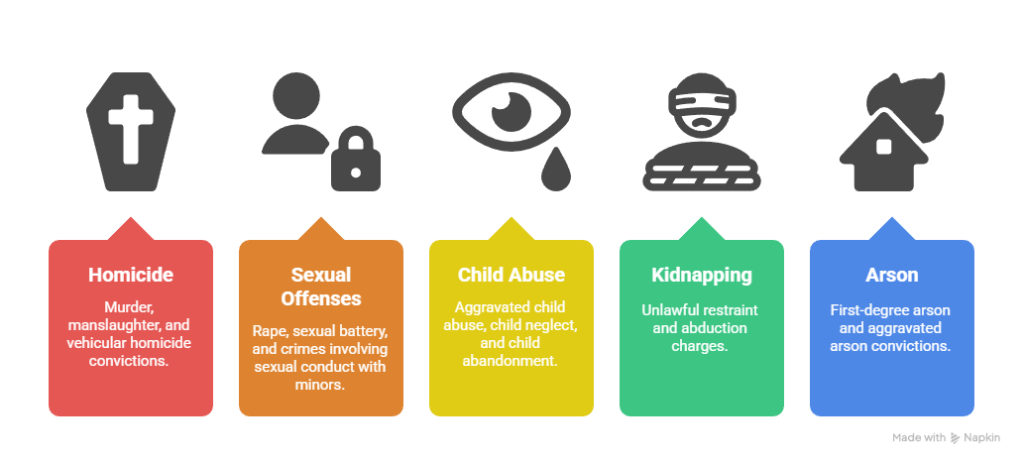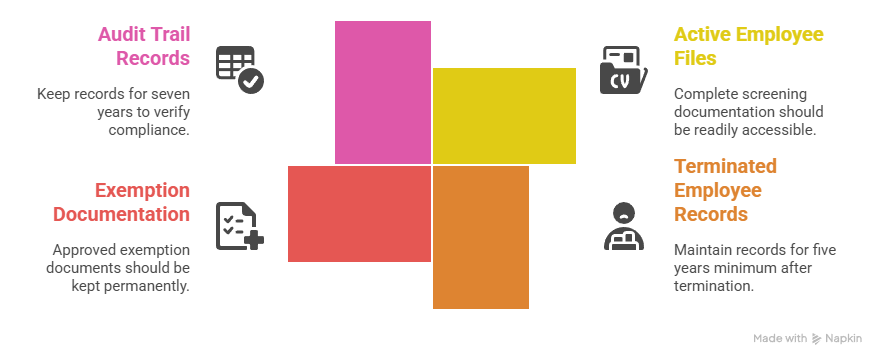Florida DCF background screening requirements include both Level 1 and Level 2 checks, with Level 2 being the more comprehensive option required for positions involving direct contact with vulnerable populations. Understanding these distinctions is crucial for employers in childcare, healthcare, and social services sectors to maintain compliance and protect vulnerable individuals.
Key Takeaways
- Level 1 screening includes a national criminal history check through FBI databases, while Level 2 adds local criminal records and disqualifying offense reviews
- Florida child abuse registry searches are mandatory components of Level 2 background screenings for DCF-regulated positions
- FDLE background checks serve as the state-level screening mechanism that processes both levels of background investigations
- Certain disqualifying offenses permanently bar individuals from Level 2 clearance, including specific felonies and crimes against children
- Processing times vary significantly between counties, with some completing reviews within 5-10 business days while others may take 3-4 weeks
- Seasonal workforce considerations require advance planning, as screening volumes increase substantially during summer months and holiday periods
What is Florida DCF Background Screening?
Florida Department of Children and Families (DCF) background screening is a mandatory security clearance process for individuals working in positions that involve contact with vulnerable populations. The screening system evaluates criminal history, abuse registries, and other disqualifying factors to protect children, elderly individuals, and disabled persons. This comprehensive vetting process ensures that only qualified individuals gain access to sensitive environments where vulnerable populations receive care and services.
The DCF screening requirements apply to a broad range of employment sectors. Childcare facilities, foster care agencies, adult family-care homes, and assisted living facilities must comply with these regulations. Additionally, home health agencies, mental health treatment facilities, and developmental disability service providers fall under DCF screening mandates.
Understanding Level 1 vs Level 2 Background Screenings
Level 1 Background Screening Components
Level 1 screening represents the basic tier of Florida's background check system. This screening includes a national criminal history search through FBI databases and a search of the Florida Department of Law Enforcement criminal records. The process typically takes 3-5 business days to complete once fingerprints are submitted to the appropriate agencies.
Key components of Level 1 screening include:

- National Criminal Database Search: Searches FBI records for federal crimes and interstate criminal activity
- Florida Statewide Criminal Search: Reviews FDLE records for in-state criminal convictions and pending charges
- Sex Offender Registry Check: Verifies status against Florida's sexual offender and predator database
Level 1 screening costs approximately $24-$42 depending on the processing agency. Results are typically delivered electronically to authorized employers within one week of fingerprint submission.
Level 2 Background Screening Requirements
Level 2 screening encompasses all Level 1 components plus additional comprehensive searches of abuse registries and local criminal records. This enhanced screening is mandatory for positions involving direct contact with children, elderly, or disabled individuals in regulated care settings. The expanded scope requires additional processing time, typically 7-14 business days for completion.
Level 2 screening includes these additional elements:
| Component | Description | Processing Time |
| Child Abuse Registry | Florida central abuse hotline records search | 3-5 days |
| Adult Protective Services | Elder/disabled abuse registry verification | 2-4 days |
| Local Criminal Records | County-level criminal history review | 5-10 days |
Enhanced review processes examine disqualifying offenses more thoroughly. Level 2 screenings require exemption applications for certain criminal histories, while Level 1 may simply report findings without detailed review.
Disqualifying Offenses and Exemptions
Permanent Disqualifiers
Certain criminal offenses result in permanent disqualification from Level 2 clearance without possibility of exemption. These offenses reflect Florida's commitment to protecting vulnerable populations from individuals with histories of serious crimes. Understanding these permanent bars helps employers and job seekers navigate the screening process more effectively.
Florida law specifies these permanent disqualifying offenses:

- Homicide and Related Crimes: Murder, manslaughter, and vehicular homicide convictions
- Sexual Offenses: Rape, sexual battery, and crimes involving sexual conduct with minors
- Child Abuse and Neglect: Aggravated child abuse, child neglect, and child abandonment
- Kidnapping and False Imprisonment: Unlawful restraint and abduction charges
- Arson: First-degree arson and aggravated arson convictions
These permanent disqualifiers apply regardless of when the offense occurred or rehabilitation efforts undertaken. No exemption process exists for individuals convicted of these serious crimes.
Exemption-Eligible Offenses
Many criminal offenses allow for exemption applications through the DCF screening process. The exemption review considers factors such as time elapsed since conviction, rehabilitation efforts, employment history, and character references. This process provides second chances for individuals with non-violent criminal histories who demonstrate rehabilitation.
Exemption applications require comprehensive documentation including:
| Required Documentation | Purpose | Timeline |
| Character References | Demonstrate community support | 2-3 weeks |
| Employment History | Show stable work patterns | 1-2 weeks |
| Rehabilitation Evidence | Prove personal growth efforts | 3-4 weeks |
The exemption review process typically takes 30-60 days once complete documentation is submitted. Approval rates vary by offense type and individual circumstances, with non-violent property crimes showing higher approval rates than violent offenses.
County-Specific Variations and Processing Times
Processing Speed Differences
Florida's 67 counties show significant variation in DCF background screening processing times due to differences in staffing, technology systems, and application volumes. Large metropolitan counties often process screenings faster due to dedicated staff and automated systems. Rural counties may experience delays due to limited resources and manual processing requirements.
Processing time ranges by county type:
- Major Metropolitan Counties: 5-10 business days average
- Mid-Size Urban Counties: 10-15 business days typical
- Rural Counties: 15-25 business days common
Miami-Dade, Broward, and Orange counties generally provide fastest processing due to high-volume automated systems. Smaller counties like Liberty, Franklin, and Glades may require additional time due to manual review processes.
Documentation Requirements by Region
Different regions may emphasize specific documentation requirements based on local regulations and historical compliance issues. Northern Florida counties often require additional character references, while South Florida regions may prioritize employment verification documentation. Understanding these regional preferences can expedite the screening process.
Central Florida counties typically request:
- Enhanced employment verification for theme park and hospitality workers
- Additional background documentation for seasonal employment patterns
- Expedited processing options for peak tourism seasons
These regional variations reflect local employment patterns and demographic considerations. Employers operating across multiple counties should account for these differences in their hiring timelines.
Seasonal Workforce Considerations
Peak Season Planning
Florida's tourism and agriculture industries create substantial seasonal employment fluctuations that impact DCF background screening volumes. Summer months see increased childcare and recreation program hiring, while winter brings healthcare and hospitality workforce expansion. These seasonal patterns require strategic planning for timely screening completion.
Seasonal screening volume increases occur during specific periods. June through August shows 40-60% increases in childcare screening applications as summer programs launch. November through February brings 30-50% increases in healthcare and senior care screenings as winter residents arrive and seasonal facilities expand operations.
Employers should initiate screening processes 4-6 weeks before seasonal start dates to ensure completion. This extended timeline accounts for increased processing volumes and potential delays during peak periods.
Agricultural Worker Special Provisions
Florida's agricultural sector employs thousands of seasonal workers in positions that may require Level 2 screening when childcare services are provided at work sites. Special provisions exist for agricultural employers who provide on-site childcare or educational services during harvest seasons. These provisions streamline the screening process while maintaining safety standards.
Agricultural screening considerations include:
- Temporary Childcare Providers: Expedited processing for harvest season programs
- Mobile Service Workers: Simplified renewal processes for returning seasonal employees
- Family Housing Programs: Enhanced screening for on-site family housing managers
Processing timelines for agricultural workers typically receive priority handling during critical harvest periods. This ensures adequate childcare coverage while maintaining regulatory compliance.
FDLE Background Check Integration
State Database Coordination
The Florida Department of Law Enforcement serves as the central coordinating agency for state-level background screening activities. FDLE maintains comprehensive criminal history databases and coordinates with local law enforcement agencies to ensure complete record coverage. This centralized system provides consistency across county boundaries while accommodating local processing variations.
FDLE's role includes maintaining updated criminal records, processing fingerprint submissions, and coordinating with federal databases for complete coverage. The agency also provides technical support to local screening agencies and ensures compliance with state and federal privacy regulations.
Technology System Updates
Recent FDLE system upgrades have improved processing speeds and accuracy for Florida DCF background screening requests. New automated matching algorithms reduce false positive rates, while enhanced database integration provides more complete criminal history coverage. These improvements benefit both employers and job seekers through faster, more accurate results.
Current system capabilities include:
- Real-time database queries for immediate preliminary results
- Automated notification systems for screening completion
- Enhanced identity verification to reduce processing errors
- Mobile-friendly interfaces for remote application submission
These technological improvements continue evolving to meet increasing screening volumes and regulatory requirements. Regular system updates ensure optimal performance and security for sensitive background information.
Florida Child Abuse Registry Searches
Registry Database Components
The Florida child abuse registry maintains comprehensive records of substantiated abuse and neglect cases involving children. This database includes perpetrator information, case details, and outcome data used during Level 2 screening processes. Registry searches identify individuals with documented histories of child maltreatment who may pose risks in positions involving child contact.
Registry searches examine multiple data sources including DCF investigation records, law enforcement reports, and court proceedings related to child protection cases. The database cross-references names, aliases, and identifying information to ensure comprehensive coverage of potential matches.
Search Result Interpretation
Child abuse registry results require careful interpretation by qualified screening professionals. Substantiated findings result in automatic disqualification for most positions involving child contact. Unsubstantiated or inconclusive findings may require additional review depending on employment requirements and employer policies.
Registry search outcomes include:
| Result Category | Employment Impact | Appeal Options |
| No Record Found | No restrictions | N/A |
| Unsubstantiated Finding | Case-by-case review | Administrative appeal |
| Substantiated Abuse | Automatic disqualification | Limited appeal rights |
Understanding these distinctions helps employers make appropriate hiring decisions while ensuring compliance with child protection requirements. Qualified legal counsel should review complex cases involving registry findings.
Employer Compliance Requirements
Record Retention Obligations
Employers subject to DCF screening requirements must maintain comprehensive records of all background check activities. These records include screening applications, results documentation, exemption applications, and renewal tracking information. Proper record keeping demonstrates compliance during regulatory audits and protects against potential liability claims.
DCF regulations require employers to maintain screening records for minimum periods based on employment duration and position type. Active employee records must remain accessible throughout employment, while terminated employee records require retention for specified periods after separation.
Record retention requirements include:

- Active Employee Files: Complete screening documentation readily accessible
- Terminated Employee Records: Five-year retention minimum for most positions
- Exemption Documentation: Permanent retention for approved exemptions
- Audit Trail Records: Seven-year retention for compliance verification
Digital record keeping systems often provide automated retention management and secure storage for sensitive screening information. These systems help ensure compliance while reducing administrative burden.
Training and Oversight Responsibilities
Employers must provide appropriate training for staff involved in background screening processes to ensure consistent application of DCF requirements. Training topics include recognizing disqualifying offenses, understanding exemption processes, and maintaining confidentiality of screening information. Regular training updates address regulatory changes and best practice developments.
Effective training programs cover legal requirements, ethical considerations, and practical application of screening criteria. Supervisory staff require enhanced training on exemption evaluation and complex case review processes.
Cost Analysis and Budgeting
Direct Screening Costs
DCF background screening costs vary based on screening level, processing agency, and additional services required. Level 1 screenings typically cost $24-$42 per application, while Level 2 screenings range from $55-$75 including all required components. Additional costs may apply for expedited processing, exemption applications, or appeal procedures.
Employers should budget for renewal screenings required every five years for most positions. Renewal costs mirror initial screening fees, though some agencies offer modest discounts for repeat applicants with clean records.
Cost breakdown for typical screening scenarios:
- Single Level 2 Application: $55-$75 initial cost
- Exemption Application Processing: $50-$100 additional fee
- Expedited Processing Upgrade: $25-$50 surcharge
- Five-Year Renewal Screening: $55-$75 standard rate
These costs represent direct fees paid to screening agencies and do not include internal administrative expenses for managing the screening process.
Hidden Administrative Expenses
Beyond direct screening fees, employers incur substantial administrative costs for managing DCF background screening programs. These hidden expenses include staff time for application processing, record maintenance, compliance monitoring, and employee communication regarding screening status. Large employers may require dedicated personnel for screening coordination.
Administrative cost factors include:
- Application Processing Time: 2-4 hours per employee for complete documentation
- Status Tracking and Follow-up: 1-2 hours monthly per pending application
- Compliance Monitoring: 10-20 hours quarterly for audit preparation
- Training and Education: 8-16 hours annually for staff development
These administrative expenses often exceed direct screening costs, particularly for organizations with high employee turnover or complex screening requirements. Automated systems can reduce some administrative burden but require initial investment and ongoing maintenance.
Conclusion
Florida DCF background screening requirements serve as critical safeguards protecting vulnerable populations while creating employment opportunities for qualified individuals. Understanding the distinctions between Level 1 and Level 2 screenings, along with county-specific variations and seasonal considerations, enables employers and job seekers to navigate the process efficiently. Proper planning, accurate documentation, and compliance with record retention requirements ensure successful outcomes for all parties involved. As regulatory requirements continue evolving, staying informed about DCF screening updates remains essential for maintaining compliant operations in Florida's care industries.
Frequently Asked Questions
How long does a Florida DCF Level 2 background screening take to complete?
Florida DCF Level 2 background screenings typically take 7-14 business days to complete, though processing times vary by county. Large metropolitan counties like Miami-Dade and Orange often process screenings within 5-10 business days, while rural counties may require 15-25 business days due to limited resources and manual review processes.
What's the difference between Level 1 and Level 2 DCF background screenings?
Level 1 screening includes national FBI database searches and Florida FDLE criminal records, while Level 2 screening adds child abuse registry searches, adult protective services registry checks, and local criminal records review. Level 2 is required for positions involving direct contact with children, elderly, or disabled individuals in regulated care settings.
Can someone with a criminal record still get DCF screening clearance?
Yes, individuals with certain criminal records may obtain DCF clearance through the exemption process. However, specific offenses like murder, sexual crimes against children, and aggravated child abuse result in permanent disqualification without exemption possibility. The exemption review considers factors like rehabilitation efforts, time elapsed, and character references.
How much does a Florida DCF background screening cost?
Level 1 DCF screenings cost approximately $24-$42, while Level 2 screenings range from $55-$75 including all required components. Additional fees may apply for expedited processing ($25-$50), exemption applications ($50-$100), or other special services depending on the processing agency.
How often do DCF background screenings need to be renewed?
DCF background screenings typically require renewal every five years for most positions. The renewal process involves completing a new screening application with current fingerprints and updated documentation, though some agencies may offer streamlined renewal processes for individuals with clean records.
Which Florida counties process DCF screenings fastest?
Major metropolitan counties including Miami-Dade, Broward, Orange, and Hillsborough generally provide fastest processing times (5-10 business days) due to automated systems and dedicated staffing. Rural counties like Liberty, Franklin, and Glades may require 15-25 business days due to manual processing and limited resources.
Additional Resources
- Florida Department of Children and Families Background Screening Unit
https://www.myflfamilies.com/service-programs/background-screening/ - Florida Department of Law Enforcement Criminal History Services
https://www.fdle.state.fl.us/cms/Criminal-History-Records/ - Florida Association of Background Screening Agencies Directory
https://www.fabsa.org/agency-directory - DCF Background Screening Exemption Application Process
https://www.myflfamilies.com/service-programs/background-screening/exemptions/ - Florida Child Abuse Registry Information and Searches
https://www.dcf.state.fl.us/programs/abuse-registry/ - FDLE Fingerprint Processing Locations Statewide
https://www.fdle.state.fl.us/cms/Criminal-History-Records/Fingerprint-Processing-Services.aspx

GCheck Editorial Team
Meet the GCheck Editorial Team, your trusted source for insightful and up-to-date information in the world of employment background checks. Committed to delivering the latest trends, best practices, and industry insights, our team is dedicated to keeping you informed.
With a passion for ensuring accuracy, compliance, and efficiency in background screening, we are your go-to experts in the field. Stay tuned for our comprehensive articles, guides, and analysis, designed to empower businesses and individuals with the knowledge they need to make informed decisions.
At GCheck, we're here to guide you through the complexities of background checks, every step of the way.





